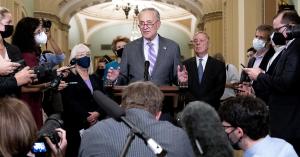With a second GOP-introduced stimulus package having failed on Capitol Hill, President Donald Trump is placing the blame on “heartless” Democrats. Thursday morning, the president blasted Democrats amid stalled negotiations and failed legislation, accusing them of not wishing to provide further relief to the American people amid the economic crisis caused by the coronavirus pandemic.
In a tweet, the president alleged that Democrats, who have pushed for additional stimulus payments and included a provision for such in the HEROES Act, “don’t want to give STIMULUS PAYMENTS to people who desperately need the money.” He also again doubled down on placing the blame for the pandemic on China. Trump concluded the fiery tweet by encouraging Republicans to “go for the much higher numbers.”
Videos by PopCulture.com
Democrats are “heartless”. They don’t want to give STIMULUS PAYMENTS to people who desperately need the money, and whose fault it was NOT that the plague came in from China. Go for the much higher numbers, Republicans, it all comes back to the USA anyway (one way or another!).
— Donald J. Trump (@realDonaldTrump) September 16, 2020
The president’s tweet came exactly a week after a GOP-introduced “skinny” stimulus package failed in a Senate vote, with Kentucky Sen. Rand Paul crossing party lines to vote “no” alongside Democrats. The package, with a price tag just above $500 million, was a far cry from the $1 trillion HEALS Act that was introduced by the GOP in July and an even further cry from the more than $3 trillion HEROES Act, which was approved by the House of Representatives but has not been taken up for a vote in the Senate. The bill proved controversial among lawmakers, blasting it as an “emaciated” proposal, as it did not include an additional round of stimulus checks or funding for local and state aid.
Since that bill’s failure, the back-and-forth on who is to blame for the stall in additional relief has been ongoing, with Democrats and Republicans pointing fingers as the American people express their frustrations and the urgent need for relief on social media. Without an additional stimulus relief bill, a number of programs, such as enhanced unemployment benefits the stall of evictions, are at risk of expiring, and the state governments are at risk of being short $312 billion on their budget sheets through the summer of 2022, something that could prompt spending cuts and layoffs.
Although both sides have expressed a desire to reach a deal, they appear no closer to an agreement now than they had been when negotiations collapsed in early August. New goal dates for a deal has hypothetically been set as Sept. 30, though multiple lawmakers have stated that a deal is not likely until after the November election.




